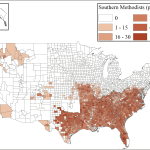It’s my privilege to share the second of three posts written by Dr. Ingrid Faro, Associate Professor of Old Testament at Scandinavian School of Theology discussing the Old Testament view of God. (Click here to read Part 1.) If you’ve ever wondered if the God of the Old Testament is different than the One found in the pages of the New Testament, this post offers a helpful discussion that references ISIS, Job’s “comforters” and Mafia bosses as it explores the question of evil. I’m looking forward to continuing the lively discussion launched on the first post in the series in this space.
* * * * * * *
Is God a Mafia Boss or Is God Good: Old Testament View of God, Part 2
by Dr. Ingrid Faro
The Bible does not give a simple defense of God’s goodness in the face of evil and suffering. There are many principles at work in the agency of good and evil portrayed in the Old Testament.
Part I focused primarily on the Principle of Action-Consequence, first provided in Genesis through the image of a Seed. The opening chapters of the Bible establish the principle that the seed of thought planted in the fertile ground of the mind produces corresponding actions, and these actions bear consequences. This principal of action-consequence is embedded within the Hebrew language of the Old Testament with ‘lexical precision.’ What is commonly viewed as ’divine retribution’ – the mafia boss or bullying concept of God – is most often, simply the Principle of Action-Consequence. We realize that actions have consequences, unless there is intervention to alter their outcome.
In this post, we will look at a second Principle: the Principle of Mercy and Grace.
This principle unfolds through the image of Dust and Breath in Gen 2:7. The Lord God created us as earthy creatures, formed from the dust of the ground. God breathed into us His own divine life. God knows our fragility. We are connected to the earth. In the Hebrew, the ‘adam (humanity) was taken from the ’adamah (ground). Yet, the Lord, infused this clay with divine status, His own breath of life. We are dust and divinity; body and spirit. This claymation bears the image of God, created to represent Him in the physical universe. He values us as His royal children, all the while knowing our inherent weakness as people of the land. We see this understanding in Psalm 103:8-18 (NET):
The LORD is compassionate and merciful; he is patient and demonstrates great loyal love.
He does not always accuse, and does not stay angry.
He does not deal with us as our sins deserve; he does not repay us as our misdeeds deserve.
For as the skies are high above the earth, so his loyal love towers over his faithful followers.
As far as the eastern horizon is from the west, so he removes the guilt of our rebellious actions from us.
As a father has compassion on his children, so the LORD has compassion on his faithful followers.
For he knows what we are made of; he realizes we are made of clay.
A person’s life is like grass. Like a flower in the field it flourishes, but when the hot wind blows by, it disappears, and one can no longer even spot the place where it once grew.
But the LORD continually shows loyal love to his faithful followers, and is faithful to their descendants, to those who keep his covenant, who are careful to obey his commands.
However, divine compassion, mercy, and grace are foreign to some. There are those who have no regard for life, no understanding of the human family.
To connect the Old Testament with modern times, listen to the words of King Abdullah of Saudi Arabia on August 30, 2014, as he spoke of ISIS: “These terrorists do not know the name of humanity and you have witnessed them severing heads and giving them to children to walk with in the street.”
ISIS is operating in Iraq, the heartland of the ancient warrior nation of the Assyrians, who extended their kingdom through brutal conquest. The Assyrians were known for their extreme tactics of torture and terror to drive fear and panic into their enemies. Evidence of their brutalities has been widely found through archaeological inscriptions and reliefs, boasting of their mass atrocities against men, women, and children, accumulating piles of heads and various body parts. It was to these violent people, to the city of Ninevah, that the prophet Jonah was sent during the reign of King Jeroboam II in the mid 8th century BC. We can now better understand his initial refusal to go. He did not want to see the repentance and subsequent mercy of God on these violent people who had no regard for human life. Yet, when they repented of their violence, and as long as they turned away from their wicked ways, God averted their destruction. Jonah, the Old Testament prophet, understood this about God. In the words of Jonah 4:2, ‘He prayed to the LORD and said, “Oh, LORD, this is just what I thoughtwould happen when I was in my own country. This is what I tried to preventby attempting to escape to Tarshish!–because I knew that you are gracious and compassionate, slow to anger and abounding in mercy, and one who relents concerning threatened judgment’ (NET). The Tomb of Jonah in Mosul was destroyed by ISIS this summer.
The Old Testament teaches us the name of humanity … the dignity of human kind, and the value we are instructed to place on life. God so values human life, that He holds mercy and grace as a higher law than action-consequence, even for the most heinous violations.
But mercy and grace become meaningless if they are unhinged from justice and righteousness. Justice is only as good as the character of moral goodness of the one who is judging. The first principle of action-consequence, pictured by the seed, is rooted in law and justice. But the Old Testament speaks of a greater principle at work, one which intervenes and overrules the first: the Principle of Mercy and Grace.
God gives mercy to the repentant, and grace to the faithful.
Far from being an arbitrary mafia boss or cosmic bully, the Bible speaks with clarity of God’s mercy and grace alongside His justice. He intervenes and redeems even the most evil intentions of those who repent, and beautifully restores the lives of the faithful, even when marred by pain and evil done against them. This is portrayed again and again through Scripture: in the Joseph narrative, through the Judges, to David, and through the Prophets, and into the New Testament, where His mercy and grace are extended to us all.
In biblical faith, we don’t serve the godfather, we serve God the Father, a loving and good God who wants us to be wise, and learn to be like Him. He gives us the freedom to learn from His Word, as we acknowledge that He is the all-wise and just God. We can learn by our mistakes, sin, and failures, returning to Him to help us restore our lives. As a good Father, He allows our failures, but He does not leave us alone in them. He is present, stretching out His hand, even when we repeatedly turn away from Him. Jesus portrayed God clearly by His own life, and in the story of the Prodigal Son He explained the heart of the Father. The Father allows us to squander His riches and leave the abundance of His house, but He runs to meet all who desire to return home. God is a good Father who embraces.
However, if the Old Testament only provided these two Principles of Action-Consequence and the Principle of Mercy and Grace, we would have a basis for sitting with Job’s comforters after disaster struck him! In the book of Job, we can clearly see the ancient world’s expectation of the Principle of Action-Consequence. Job himself argues his case with God that he is innocent, so why did evil come to him? The same must be asked of the evils that come to many of us. For evils do come upon those who do good and serve God faithfully.
The hardest thing to accept, is that God gives humanity freedom to be cruel, hateful, heartless. These evils steal, kill and destroy innocence, kindness, and harmony. While we witness the lack of humanity in ISIS, these horrors cry out from every corner of the world throughout history, from wars to back alleys, from migrant fields to bedrooms. The very earth itself is repulsed, and bears witness to the atrocities perpetuated against God and His creation.
There is no single paradigm, there are no simple answers to the problems of evil. Many forces are at work in this world, and many agencies of evil. There is evil that comes upon us simply by living in a world that is a conflict zone between two kingdoms. Job was not given the answer he was first looking for, nor told the background behind the evils that came to him. But the answer he was given, satisfied him. Yes, God does allow suffering. But He enters into our suffering with us, and for us. And when we allow, He takes the very substance of our worst pain and gives us ‘… beauty for ashes …’ (Isa 61:3). Let’s continue to wrestle, and ask the hard questions. In the meanwhile, for those still shaking their fist at heaven, allow yourself to consider the possibility that God really is good, and that His goodness is not just a theological construct. Allow God the opportunity to enter your pain, to reframe your past, redeem your present, and restore your future.
We will explore further in Part 3.















